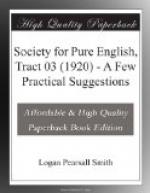Exempli gratia. Here are two words with very different titles and claims, nesh and hyppish.
Nesh, which has two columns in the Oxford Dictionary, begins in A.D. 888, and is still heartily alive in Yorks. and North Derbyshire, where it is used in the sense of being oversensitive to pain and especially to cold. In this special signification, to which it has locally settled down after a thousand years of experience, it has no rival; and its restoration to our domestic vocabulary would probably have a wholesome moral and physical effect on our children.
Hyppish is the Englished form of hypochondriacal, its suffix carrying its usual diminutive value, so that its meaning is ’somewhat hypochondriacal’. Berkeley, Gray, and Swift used hyps or the hyp for hypochondriasis, and the adjective was apparently common. It would seem that hypochondria was then spoken, as hypocrisy still is, with the correct and pleasant short vowels of the Greek prefix, not as now with a long alien diphthong haipo-. It was presumably this short y that accidentally killed hyppish; for the word hipped was used of a horse lamed in the hip, and alongside of this hipped, and maybe attracted by it, an adjective hypt arose. When once hyp and hypt were confounded with hip and hipped, hyppish would suffer and lose definition. But hypt and hipped combined forces, and were probably even from the first in their present uncertain condition, for when nowadays a man says that he is hipped, he has no definite notion of what he means except that he is in some way, either in his loins or mind incapacitated and out of sorts. Whether hypt and hipped have mortally wounded each other or are still fighting in the dark may be open to discussion: hyppish has now a fair field, and if people would know what the word means, it might be restored, like nesh, to useful domestic activity.
6. The example given of the word fast on p. 12 suggests another matter to which attention might be paid. If one looks up any word in the Oxford Dictionary, one will be almost distressed to see how various the significations are to which it is authoritatively susceptible. A word seems to behave like an animal that goes skirting about discontentedly, in search of a more congenial habitation. It is sometimes successful, and meets with surprising welcome in some strange corner where it establishes itself, forgetful of its old home: sometimes, like the bad spirit in the gospel, it will return to the house whence it came forth. It is, of course, natural and essential to a living language that such shades and varieties of meaning should evolve themselves, although they are incidentally a source of ambiguity and subtle traps for careless logic; but when these varieties so diverge as to arrive ultimately at absurdities and contradictions, then it is advisable to get rid of them. In such extreme cases the surgeon’s knife may sometimes save life; it is the only cure; and to use a word in a deforming or deformed sense should be condemned as a solecism. Contributions, stating examples of this with the proposed taboo, are invited.




